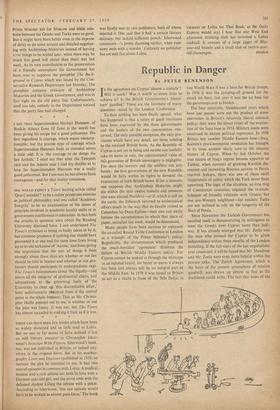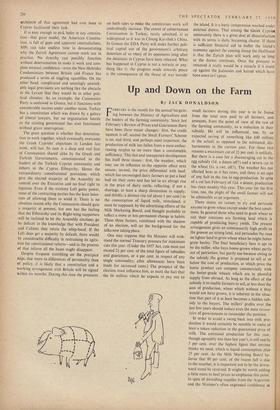Republic in Danger
By PETER BENENSON
Ithe agreement on Cyprus 'almost a miracle'? 'Will it work? Was it worth so many lives to achieve it? Is the British Government's 'about- turn' justified? These are the foremost of many questions raised by the London Conference.
To date nothing has been finally agreed; what has happened is that a series of good intentions have been expressed by the three governments and the leaders of the two communities con- cerned. The only possible exception, the only pro- visions which have any detail, are those relating to the retained British bases. As the Republic of Cyprus is not yet in being and no one can lawfully take its name in vain, the constitutional value of this guarantee of British sovereignty is negligible. For once the lawyers and the soldiers can join hands : the first government of the new Republic would be fully within its rights to demand the evacuation of both British bases. If for a moment one supposes that Archbishop Makarios might die within the next twelve months and someone else were elected President—or if, which is still on the cards, the Ethnarch reverted to ecclesiastical affairs much in the way that de Gaulle retired to Colombey-les-Deux-Eglises—then one can easily foresee the circumstances in which that piece of paper, initialled last week, would be denounced.
Many people have been anxious to represent the so-called Round Table Conference in London as a triumph of the Prime Minister's policy. Regrettably, the circumstances which produced the much-heralded 'agreement' illustrate the failure of British Middle Eastern policy. For Cyprus cannot be looked at through the telescope as an isolated island; for better or worse it always has been and always will be an integral part of the Middle East. In 1878 it was leased to Britain to act as a shield in front of the Nile Delta; in two World Wars it was a base for British troops; in 1956 it was the jumping-off ground for the attack on Suez; last year it was the air base for the paratroops sent to Jordan.
The four miserable, bloodstained years which have just passed were not the product of some aberration in Britain's relatively liberal colonial policy; they were the direct result of the evacua- tion of the Suez base in 1954. Military needs were construed to dictate political repression. In 1958 Britain lost another Middle Eastern base—Iraq. Kassim's pro-Communist revolution has brought , in its train another sharp turn in the sinuous history of Cyprus. When by last October the true nature of Iraq's regime became apparent to Turkey, when rumours of growing Kurdish dis- content and increasing Russian activity in Persia reached Ankara, there was one of those swift reappraisals of policy which the Turk never finds agonising. The logic of the situation, an iron ring of Communist countries, required the re-estab- lishment of friendly relations with Greece, her one pro-Western neighbour—for realistic Turks are not inclined to rely on the longevity of the Shah of Persia.
Since November the Turkish Government has excelled itself in demonstrating its willingness to meet the Greeks over Cyprus more than half- way. It has already emerged that Mr. Zorlu was the man who pressed for Cyprus to be given independence within three months of the London initialling. If the full story of the last negotiations ever comes out, it will be found that Mr. Menderes and Mr. Zorlu were even more helpful within the private talks. The Zurich Agreement, which is the basis of the present atmosphere of relative goodwill, was drawn up almost as fast as the draftsmen could write. The fact that none of the architects of that agreement had ever been to Cyprus facilitated their task.
It is easy enough to pick holes in any constitu- tion—that great model, the American Constitu- tion, is full of gaps and apparent contradictions. MPs can take endless time in demonstrating why the Zurich Agreement cannot work out in practice. No dyarchy can possibly function without determination to make it work and com- plete mtutual confidence—even the New Hebrides Condominium between Britain and France has produced a series of niggling squabbles. On the other hand, complicated and seemingly unwork- able legal provisions are nothing like the obstacle in the Levant that they would be in other poli- tical climates. As an example, the Communist Party is outlawed in Greece, but it functions with considerable success under another name. Turkey has a constitution which was drawn by a galaxy of liberal lawyers, but no organisation hostile to the existing government has ever functioned without grave interruption.
The great question is whether that determina- tion to work together, which eventually overcame the Greek Cypriots' objections in London last week, will last. Its root is a deep and real fear of Communism shared alike by the Greek and Turkish Governments, communicated to the leaders of the Turkish Cypriot community and inborn in the Cyprus Ethnarchy. Hence the extraordinary constitutional provisions which give the elected majority of the Assembly no control over the Executive and no final right to legislate. Even if the extreme Left gains power, none of the contracting parties has the least inten- tion of allowing them to wield it. There is no absolute reason why the Communists should gain a majority at present, but one has the feeling that the Ethnarchy and its Right-wing supporters will be inclined to let the Assembly elections go by default in the knowledge that with President and Cabinet they retain the whip-hand. If the Left does get a majority by default, there would be considerable difficulty in restraining its agita- tion for constitutional reform—and in the process of that reform all the bases might disappear.
Despite frequent stumbling on the precipice edge, due more to differences of personality than of policy, it is likely that a constitution and a working arrangement with Britain will be signed within six months. During this time the pressures on both sides to make the constitution work will undoubtedly increase. The extent of subterranean Communism in Turkey, rarely admitted, is as widespread as it was in Chiang Kai-shek's China. In Greece the EDA Party will make further poli- tical capital out of the government's arbitrary detention of so Many of its opponents long after the detainees in Cyprus have been released. What has happened in Cyprus is not a miracle or any- thing like it; the progress made towards peace is the consequence of the threat of war outside the island. It is a hasty compromise reached under external duress. That among the Greek Cypriot community there is a great deal of dissatisfaction with its terms is daily becoming clearer. If there is sufficient financial aid to buffer the island's economy against the coming slump the likelihood is that the Zurich plan will work only so long as the duress continues. Once the pressure is removed it really would be a miracle if it stood up against the jealousies and hatred which have been sown in Cyprus.



































 Previous page
Previous page